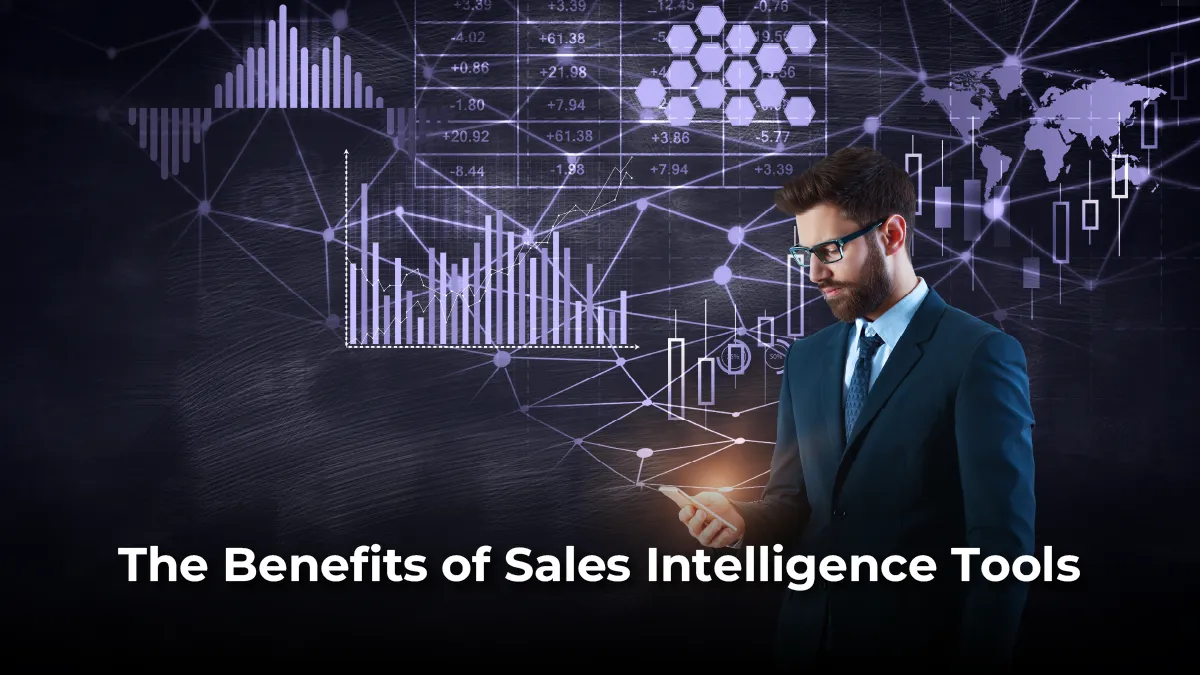Sales is changing fast, and so are the things buyers want. At every level of the sales cycle, personalization is crucial nowadays, necessitating precise and pertinent data. Here’s where sales intelligence comes into play.
It is using data to improve sales operations, from prospecting to conversion. The sales intelligence platform helps sales teams find and convert qualified prospects. It automates prospecting, gets lead insights, and directs outreach efforts.
The definition, features, and benefits will all be covered in this article. Let’s dive in!
What is Sales Intelligence?
Sales intelligence is the data utilized for creating ideal customer profiles, generating leads, accelerating pipelines, and identifying growth opportunities.
Your go-to-market strategy needs good sales info. It must include decision-makers, reporting systems, financials, budgets, corporate projects, staff changes, tech stacks, and predictive features like intent and buying signals. Real-time analytics and data from sales intelligence can also help marketing teams.
Why Artificial Intelligence in Sales Matters

To put it simply, AI adds value to sales processes by scaling and enhancing manual procedures.
AI is used by sales reps to automate repetitive processes like lead nurturing and prospecting. Sales reps can concentrate on more crucial tasks, such as completing deals. Basically, to enhance sales targeting, sales leaders use intelligence data to create more accurate consumer profiles.
In a changing business environment, you’ll need a source of precise contact data to stay on top of prospects. AI also offers insights based on data. AI also offers insights based on data. AI can, for instance, look at a customer’s past purchases and recommend items that they would find interesting. Salespeople are able to sell more successfully and efficiently as a result.
In the end, it all comes down to working smarter, not harder.
Also Read: Sales Messaging That Converts: A Complete Guide
The Benefits of Sales Intelligence Tools

Sales intelligence solutions can greatly improve sales processes. They let your salespeople pursue the best opportunities at the right time. They also optimize the impact of every marketing and sales dollar.
● Discover What Really Affects Purchase Decisions
This analytics tool, based on solid data, can be powerful. It reveals who, what, how, and when people buy, if used wisely. With more information about prospects, business development teams can create better outreach. They can then break through the clutter with relevant, focused content that addresses prospects’ pain areas.
● Focus on key Leads
Sales intelligence tools give information about each prospect’s potential for success. A salesperson must prioritize leads. Several factors affect their quality and urgency. These include a contact’s role, seniority, and purchasing authority, as well as prior engagement. Sales teams can boost productivity by focusing on high-potential prospects. Sales intelligence solutions can help with this.
● Upselling and Cross-Selling with Purpose
Sales intelligence systems find cross-selling and upselling opportunities. They do this by analyzing consumer behavior and purchase habits in real time. Revenue from current clients may rise as a result.
● Build Sales–Marketing Alignment
CRM systems are improved and easily integrated with many sales intelligence tools. As a result, a centralized platform is created that is used by marketing, sales, customer service, and product teams to handle smooth client interactions. Conversion-boosting sales and marketing alignment depends on a platform like this.
● Utilize Data That Is Always Actionable
To stay ahead of a shifting market, use new, proactive intelligence. It should put prospects into a sales team’s workflow. Sales intelligence software can help business development teams. It blends real-time buying signals with advanced prospect data. It can help them reach the right customer at the right time.
● Improve Lead Quantity and Quality
A report says that companies using marketing intelligence and B2B sales tools improved their leads. This, in turn, boosted growth and revenue.
What are Some Common Sales Intelligence Platform Features?
A sales intelligence platform typically has: forecasting tools, lead scoring, data enrichment features, and client segmentation capabilities. Let’s take a closer look at each of these.
Customer segmentation
It should be possible for your sales platform to divide up your clientele into various groups. You ought to be able to segment them according to several standards, such as:
- Industry
- Demographics
- Behaviour
- Preferences
- Purchases history
Dividing your audience into sub-audiences may boost your marketing and sales.
Lead scoring
Not every lead is created equally. Your platform’s lead scoring features should let you rate leads using your own criteria. These include engagement level, buying signals, and your ideal customer profile (ICP).
Data enrichment
Your intelligence software should automate data enrichment. It should add new info to customer profiles, like names, contact information, websites, and social media accounts.
Sales forecasting
Sales forecasting and thorough data collection allow you to see what is ahead. It uses historical data, market trends, and predictive analytics. It does this to forecast future revenue.
How to Choose the Right Sales Intelligence Solution for Your Business
This brief guide will assist you in choosing the best option for your particular requirements:
Create your ideal customer profile
Static demographic information is insufficient if you want to stay competitive. In this dynamic market, you must constantly update your ideal client profile.
You can maintain your ICP current with the following data if you have a decent sales tool:
- buy triggers
- purpose
- technology used
- content consumed
Improve sales prospecting
The goal of sales data is to comprehend the customer journey.
A sales trigger, for example, alerts you when a customer is at the bottom of your marketing funnel.
You may make prompt decisions to maximize conversions with the help of the real-time information you receive about your leads.
Investigate the Coverage and Accuracy of Data
Sales intelligence tools collect most of their data by scraping online sources. With about 30% of data decaying yearly, human authentication ensures accuracy.
Moreover, you must ensure that your choice of tool updates it regularly for accuracy.
Find opportunities for upselling and cross-selling
The best ways to boost revenue and customer value are cross-selling and up-selling.
With the right sales platform, you can categorize clients, measure behavior, and customize experiences.
If someone buys running shoes, they will likely need a running belt, reflective clothes, a fitness tracker, and other running accessories.
This enables you to target prospects who are most likely to convert with your marketing efforts.
Acquire key competitor insights
Understanding your target audience is just as crucial as knowing what your competitors are doing. These insights allow you to:
- Find new rivals in your industry and keep an eye on their advertising strategies.
- comprehend their current tactics and previous behaviors.
- Establish benchmarks.
It becomes easier to recognize competitive hazards and create counterstrategies the more you keep an eye on and comprehend your rivals.
Final Thoughts
Sales intelligence is more than a tool. It’s the key to smarter, more efficient, and highly personalized sales strategies. By using AI, big data, and predictive analytics, businesses can better understand their prospects. They can also build stronger, more meaningful relationships with them.
With customer expectations at an all-time high, this process is vital. In short, it’s now a must for staying competitive. Whether it’s identifying hidden opportunities, shortening the sales cycle, or improving customer retention, this analytic tool empowers sales teams to work smarter, not harder.


Comments are closed.